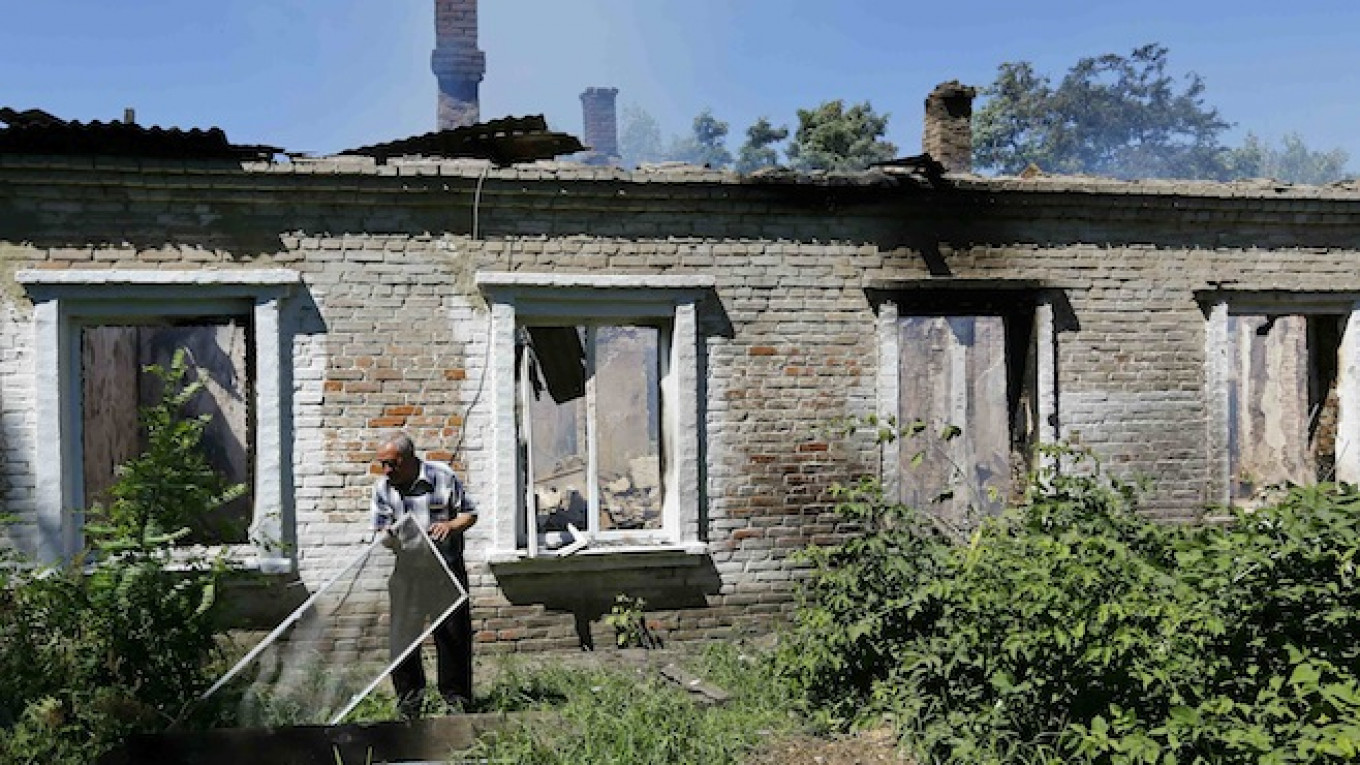KARLOVKA, Ukraine — Ukrainian forces and pro-Russian separatists fought with heavy weapons in the country's east on Tuesday, and the rebels captured the Interior Ministry headquarters in a major city after an hours-long gun battle, a day after the president said rebels were not serious about peace talks and ended a cease-fire.
The often-broken cease-fire had given European leaders 10 days to search in vain for a peace deal, and its end raised the prospect of an escalation in a conflict that has already killed more than 400 people. Ukrainian forces have been unable to suppress the rebels in two months of fighting, and it was not clear now what they would be doing differently to change that situation.
Ukrainian President Petro Poroshenko had called a unilateral cease-fire to try to persuade the rebels to lay down their weapons and hold peace talks. Some of the rebels later signed onto the cease-fire as talks began. But each side accused the other of repeated violations.
Poroshenko announced the end of the cease-fire on Monday night, and on Tuesday the military made artillery and air strikes against separatist positions, Defense Ministry spokesman Oleksiy Dmytrashkovsky told Interfax. He said one service member was killed and 17 wounded in the previous 24 hours, and that a Su-25 attack aircraft was damaged. There was no comment on casualties from the rebels.
Near the village of Karlovka, 30 kilometers northwest of the eastern regional capital of Donetsk, residents told The Associated Press that government forces and rebels began firing heavy weapons at each other from positions on either side of a bridge early Tuesday, just hours after the cease-fire expired.
"There was shooting near the water. Even the water was splattering out," said Inna Vladimirovna, who gave only her name and patronymic, fearful of being identified. "We know when they are just shooting to scare and when they are shooting to kill."
In Donetsk, rebels attacked a police building, and fighting raged in the city center. The streets were deserted and rifle fire could be heard. After hours of gun battles the rebels took over the Interior Ministry compound, and the body of a plainclothes police officer lay outside.
The interior minister said Ukrainian forces had repelled a rebel attack, but that clearly wasn't the case.
"I was driving and some people appeared with automatic weapons," said Vitaly, who said he was too fearful to give his last name. "They put me and my girlfriend on the ground and then they said: 'Run away from here!'
"I don't know who is fighting whom. We are standing here. We are afraid and shaking."
European leaders have been pressing President Vladimir Putin to persuade the rebels to lay down their weapons. The West says Russia is sending weapons, including tanks and rocket launchers, to the rebels and allowing Russian citizens to cross the border to fight, and says Putin has broad leverage over them.
Russia rejects those claims and says it has only limited influence on the rebels, urging the Ukrainian government to negotiate directly with them.
Poroshenko held four-way phone talks with Putin, German Chancellor Angela Merkel and French President Francois Hollande on Sunday and Monday, but said those did not produce enough progress to merit extending the cease-fire.
European leaders have threatened a new round of economic sanctions against Russia if it and the rebels do not meet conditions set by Poroshenko. But ambassadors from the European Union's 28 governments decided Tuesday in Brussels that they were not ready to impose new sanctions, instead agreeing to prepare a proposal to be decided at their next meeting Monday, according to an EU official.
That proposal would target those responsible for fomenting unrest in eastern Ukraine, according to a diplomat from a major EU country, and could include travel bans and asset freezes for both individuals and companies. The EU has so far sanctioned only individuals.
Both the EU official and the diplomat spoke on condition of anonymity because they were not allowed to discuss the closed-door talks publicly.
See also:
Poroshenko Ends Cease-Fire, Promises to Attack Rebels in East Ukraine
A Message from The Moscow Times:
Dear readers,
We are facing unprecedented challenges. Russia's Prosecutor General's Office has designated The Moscow Times as an "undesirable" organization, criminalizing our work and putting our staff at risk of prosecution. This follows our earlier unjust labeling as a "foreign agent."
These actions are direct attempts to silence independent journalism in Russia. The authorities claim our work "discredits the decisions of the Russian leadership." We see things differently: we strive to provide accurate, unbiased reporting on Russia.
We, the journalists of The Moscow Times, refuse to be silenced. But to continue our work, we need your help.
Your support, no matter how small, makes a world of difference. If you can, please support us monthly starting from just $2. It's quick to set up, and every contribution makes a significant impact.
By supporting The Moscow Times, you're defending open, independent journalism in the face of repression. Thank you for standing with us.
Remind me later.






